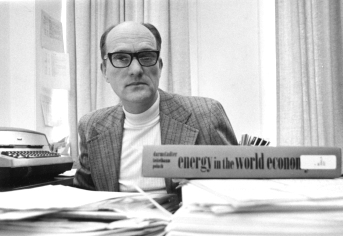Edward Renshaw: Scholar, Mentor and Walker
 |
UAlbany professor emeritus of economics Edward Renshaw in 1979. Renshaw, an expert in natural resource economics and stock markets, was especially regarded for his mentorship of students. (Photo courtesy M.E. Grenander Dept. of Special Collections and Archives) |
Edward Franklin Renshaw loved to debate and to walk. The long-time UAlbany professor of economics passed away on Jan. 14, 2010 at the Hanover (N.H.) Terrace Healthcare facility after a brief illness.
He was born on a farm in Armour, S.D. on April 27, 1933, the eldest of six children. He received a doctorate in economics from the University of Chicago in 1958.
Renshaw began teaching at UAlbany in 1967 in the departments of Economics and Finance following faculty appointments at the University of Southern California and the University of North Carolina, Chapel Hill. His main career interests were natural resource economics, stock market investment, and mentoring his numerous Ph.D. students. He served as a consultant to the Saudi Arabia Finance Ministry for two years under the auspices of the United States Treasury.
On campus, Renshaw was known for walking everywhere. He walked to school early each morning and then spent 2 or 3 hours in the library poring over financial information.
"The first recollection is seeing Ed walking around campus, gathering papers blowing about, trying to improve the University in a small way � picking up pens and pencils," said Don Reeb, professor emeritus of Economics. "Ed was a generous and gentle person. His patience with students � especially Ph.D. students � is worth remembering."
Reeb mentioned how he and other faculty members relied upon Ed and will remember him for his helpfulness in our research efforts, whether it was in estimating the economic costs of acid rain or in business cycle analysis or in forging a new area of economic research in municipal bonds and finance. "We all benefited from knowing Ed and having the privilege of working with him," said Reeb.
Terrence Kinal, professor and chair of the Economics Department, also remembers Renshaw for his keen intellect and ability to make guest lecturers squirm. "I don't remember him debating with faculty, although in department meetings he would certainly express his opinions; but in seminars, he would not let the presenter off easy."
Renshaw wrote two books: Toward Responsible Government: An Economic Appraisal of Federal Investment in Water Resource Programs (1958), and The End to Progress: Adjusting to a No-Growth Economy (1976), and served as the editor of The Practical Forecaster�s Almanac: 137 Reliable Indicators for Investors, Hedgers and Speculators (1992), in addition to the more than 300 professional articles he authored.
He also wrote numerous letters to the editor and op-ed pieces that were published in the Times Union and The New York Times. Renshaw also testified before the U.S. Congress as well as the New York State legislature on economic matters.
"Ed was very influential in the formative years of the department�s graduate programs, and afterwards as well," said Kinal. "He was a first-rate scholar, a prolific writer, a brilliant teacher, and an outstanding mentor."
When Renshaw retired in 1998 with the rank of Professor Emeritus, he moved to New Hampshire to be near his grandchildren.
Renshaw is survived by his wife of over 50 years, Patricia; their four sons, Perry, a professor of psychiatry at the University of Utah; Andy, a pathologist in Miami; Tony, a research director at a financial software company in New York; and Carl, a professor of earth sciences at Dartmouth; and by nine grandchildren.
![]() For more news, subscribe to UAlbany's RSS headline feeds
For more news, subscribe to UAlbany's RSS headline feeds


